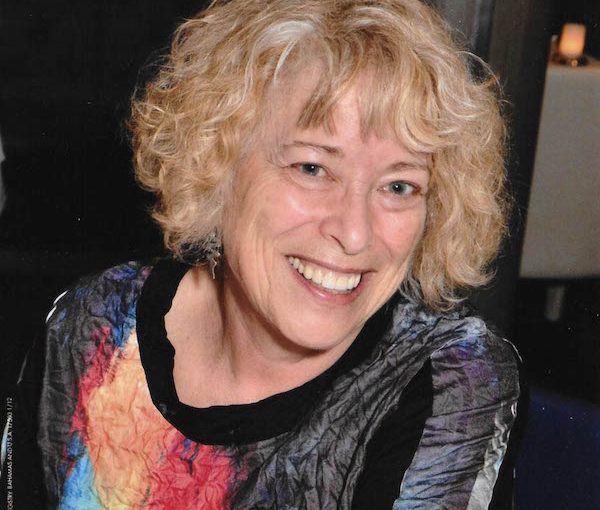Chaplain Sari Shernofsky (photo by Norwegian Cruise Line)
Earlier this month, Sari Shernofsky described her experiences as a chaplain in a Zoom lecture called Stories from a Narrow Bridge: Meeting People in Time of Need. The talk’s title comes from a quote by Reb Nachman of Breslov: “All the world is just a narrow bridge and the main thing is to have no fear at all.” For Shernofsky, a recent transplant to Victoria from Calgary, those words were a call to pursue training as a multifaith hospital chaplain.
Shernofsky’s talk was part of Kolot Mayim Reform Temple’s current lecture series, Building Bridges: Hineini – Answering the Call to Heal the World. It took place on Jan. 8.
Shernofsky worked in hospital and hospice settings for 15 years, with the objective of offering compassionate care to those in need. She also served as the Calgary Jewish community chaplain where, in addition to visiting individuals, she helped set up support groups and various training workshops for synagogues that wanted to become involved in community care.
According to Shernofsky, to care for others in their time of need – whether it be an illness, end-of-life care or simply to connect with those who are isolated or alone – is not a choice but an obligation she views as a profound Jewish value.
A chaplain provides spiritual and emotional support to people in institutional settings. Healthcare chaplains, such as Shernofsky, are trained to work with people of different faiths. Though derived from a Christian word, a current use of chaplain encompasses the work done by spiritual-care providers. Many who go into the field do so later in life, as life experience is advantageous to the job. Shernofsky had worked in the corporate world before entering the chaplaincy. “I wanted at a certain point to work with my heart and not my head – to [be able to] look back at the end of my life and say I did something to help someone else that was meaningful,” she said.
“Maybe we are the bridge, and we are reaching out our hands to others – that is basically what a chaplain does. And there is a chaplain in all of us, to reach out our hands and make tikkun olam [repairing the world] happen,” she said.
As she explains it, her job was to visit people and let them take her into their world. Among the visits was one to someone she met while studying to be a chaplain. One evening, at midnight, she received a message on her pager notifying her that the daughter of an elderly evangelical man was looking for a Bible so she could read scripture to him. Once brought, the Bible did not create the desired effect, so the daughter asked for a hymnbook. Shernofsky returned with a hymnbook, which didn’t work either.
Silence ensued. Shernofsky finally walked over to the head of the bed and placed her hand on the man’s forehead. “I told him what a special life he led and how loved he was. I talked about the family being around and how much love was surrounding him. As I was talking gently to him, the daughter and her friends started humming ‘Amazing Grace’ in the background. I had a back-up group. And it was the most magical moment, a holy, sacred moment. When it was over, the daughter had a wonderful smile on her face. We gave her a moment that she needed. I walked out of the room at two in the morning and I was higher than a kite.”
In another instance, a Jewish man in his 60s came into the hospital in critical condition. At a certain point, doctors considered removing his life support, but his rabbi objected and he remained in hospital for another month.
“I realized that the family had time during that month to get over the initial shock and get used to the idea. Perhaps more importantly, they did not have to make a decision to pull the plug. And I don’t know how families can do that, and how awful it must be because there has got to be a place in the back of your head that says, ‘What if I hadn’t?’ It was a real learning experience for me about timing.”
She also recounted the lesson she received from a woman who had been bedridden in a hospital for several years. The woman was adored by hospital staff, Shernofsky said. “I learned that, when you have so little, you can still make a difference.”
Shernofsky ended with a few words about medical assistance in dying, or MAiD. “People choose MAiD because they are afraid of suffering, they don’t want to be helpless and don’t want to be a burden to others,” she said. “Maybe some of those reasons are a bit misguided. What happens with MAiD is often poor information. People are not told what other supports are available, like palliative home care and hospice. There are lots of good things about hospice, people are not educated about them and that’s a shame.”
The next speaker in the series is McGill University’s Prof. Morton Weinfeld, who recently published an updated edition of his book, Like Everyone Else But Different. He speaks Feb. 5, 11 a.m. To register, visit kolotmayimreformtemple.com.
Sam Margolis has written for the Globe and Mail, the National Post, UPI and MSNBC.

